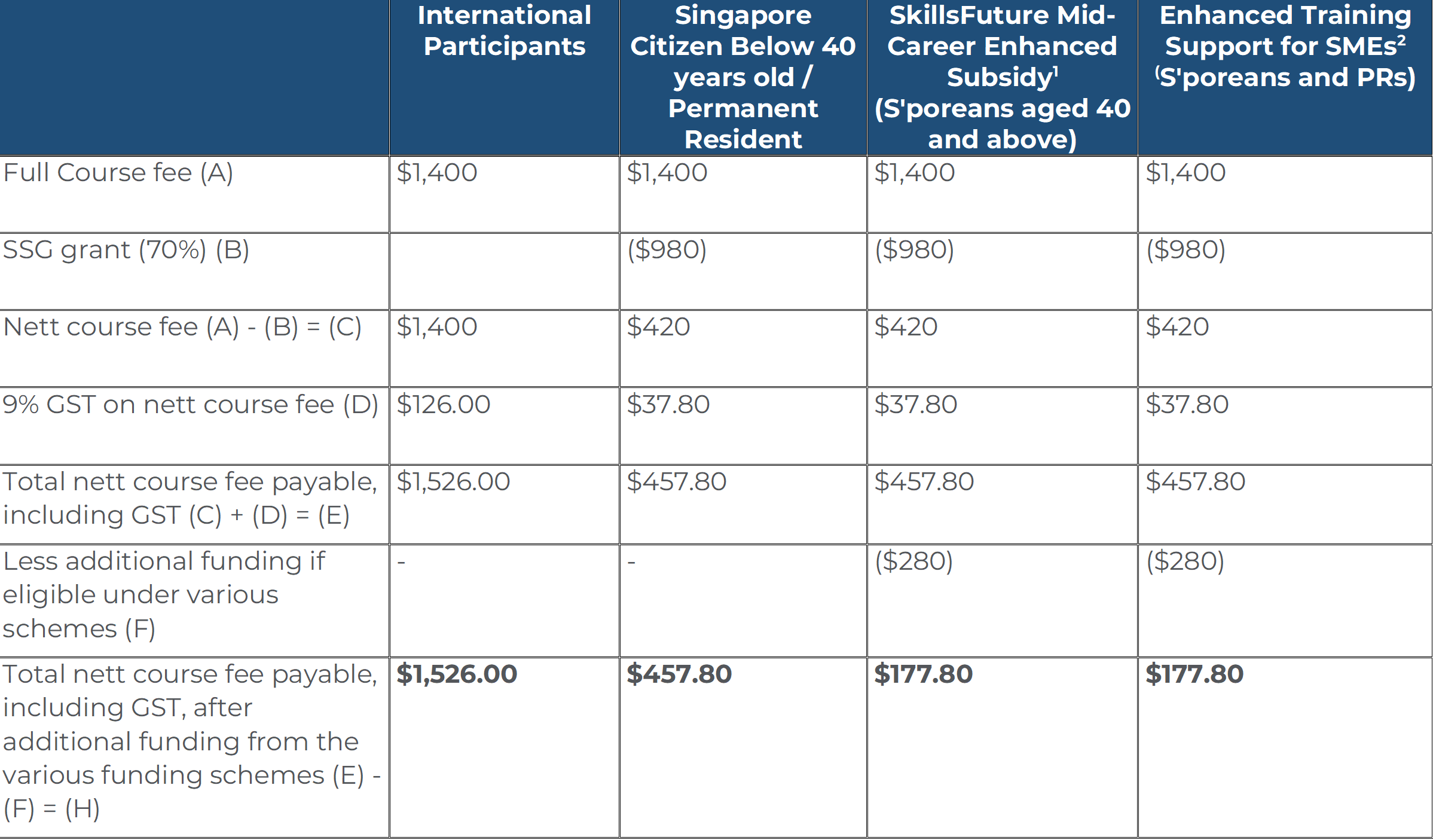Duration: 2 days
Dates: 11 and 12 July, 10 and 11 October 2024
Level: Intermediate
Venue: Singapore University of Social Sciences
This course presents participants with a systematic approach for the quantification and management of greenhouse gas (GHG) emissions and provides examples of best practices for optimal carbon management and quantification. Participants will be guided on the details of assessing carbon footprint and delivering well-structured and complete carbon footprint reports in accordance with international standards.
The course would provide participants with a comprehensive framework, embedded with practical examples, of how to conduct a carbon footprint assessment and design a carbon action plan.
This course is suitable for anyone involved in carbon footprint quantification and communication: carbon and environmental consultants, supply chain managers, ESG leaders, and business professionals of companies who are seeking to build a foundation in carbon footprint measurement.
This course is a collaborative effort with Deloitte.
Architects, engineers, HR personnel, financial consultants, sustainable consultants, carbon and environmental consultants, supply chain managers, facility managers, etc.
- Understanding climate change, carbon footprint and trends
- Overview of the international standards
- Overview of carbon pricing act
- Introduction to carbon footprint assessment methodology
- Introduction to standards such as GHG Protocol
- Lifecycle assessment standards
- Collection of activity data for carbon footprint
- Application of emissions factors for carbon footprint
- Quantification of carbon footprint
- Setting targets for carbon footprint reduction
- Carbon footprint report and communication
- Challenges in preparing a carbon footprint and case studies
A. Knowledge and Understanding (Theory Component)
By the end of this course, participants should be able to:
- Appraise the carbon footprint assessment methodology
- Formulate the goal and scope of carbon footprint assessment
- Analyse the life cycle activities and screen business facilities for emission identification
- Prepare the carbon footprint assessment
B. Key Skills (Practical Component)
By the end of this course, participants should be able to:
- Design data collection template
- Quantify carbon footprint and communicate carbon footprint information
- Propose carbon footprint reduction solutions
- Recommend a roadmap for carbon footprint reduction
| Time | Agenda |
|---|
| Day 1 |
| 09:00 - 09:30 | Course overview |
| 09:30 - 10:30 | Understanding climate change, carbon footprint and trends |
| 10:30 - 10:45 | Break |
| 10:45 - 11:45 | Overview of the international standards |
| 11:45 - 12:30 | Overview of carbon pricing act |
| 12:30 - 13:30 | Lunch |
| 13:30 - 14:30 | Introduction to carbon footprint assessment methodology |
| 14:30 - 15:45 | Introduction to standards such as GHG Protocol |
| 15:45 - 16:00 | Break |
| 16:00 - 17:30 | Lifecycle assessment standards |
| Day 2 |
| 09:00 - 10:30 | Collection of activity data for carbon footprint |
| 10:30 - 10:45 | Break |
| 10:45 - 12:15 | Application of emissions factors for carbon footprint |
| 12:15 - 13:15 | Lunch |
| 13:15 - 14:00 | Quantification of carbon footprint |
| 14:00 - 14:45 | Setting targets for carbon footprint reduction |
| 14:45 - 15:45 | Carbon footprint report and communication |
| 15:45 - 16:00 | Break |
| 16:00 - 17:30 | Challenges in preparing a carbon footprint and case studies |
| 17:30 - 18:00 | Assessment |
- Attendees should have a basic understanding of environmental ecosystem.
- Have good English proficiency.
- Possess basic information and communication technology (ICT) skills.
- Possess basic understanding on climate change.
- Be able to source and analyse relevant materials from the workplace, library, internet or online databases for information on climate change.
 Grace Cheah is the owner/founder of Sustinere Pte Ltd, an independent consultancy which provides sustainability related consulting services to clients across various industries, on topics ranging from health and safety, environment, supply chain, labour and ethics issues, sustainability reporting and assurance. She has 12 years of experience in consultancy and auditing for various management systems, traceability schemes and social compliance standards. She holds a Diploma in Adult Continuing Education and has been delivering sustainability related training for Singapore Management University, Global Compact Network Singapore and Singapore Green Building Council since 2018. Grace has experience as a lead verifier for assurance of Sustainability Reports and Integrated Reports for various companies in the region and is a Lead Certified Sustainability Assurance Practitioner. She holds a M.Sc. in Biochemical Research from Imperial College London and a B.Sc. (Hons) in Biotechnology from University College London.
Grace Cheah is the owner/founder of Sustinere Pte Ltd, an independent consultancy which provides sustainability related consulting services to clients across various industries, on topics ranging from health and safety, environment, supply chain, labour and ethics issues, sustainability reporting and assurance. She has 12 years of experience in consultancy and auditing for various management systems, traceability schemes and social compliance standards. She holds a Diploma in Adult Continuing Education and has been delivering sustainability related training for Singapore Management University, Global Compact Network Singapore and Singapore Green Building Council since 2018. Grace has experience as a lead verifier for assurance of Sustainability Reports and Integrated Reports for various companies in the region and is a Lead Certified Sustainability Assurance Practitioner. She holds a M.Sc. in Biochemical Research from Imperial College London and a B.Sc. (Hons) in Biotechnology from University College London.
Please submit the following documents to cet@suss.edu.sg:
- Coloured copy (back and front) of NRIC for Singaporeans and PRs, or "Employment"/"S" Pass for foreign applicant
- Application form
Course Fee

1 Mid-Career Enhanced Subsidy: Singaporeans aged 40 and above may enjoy subsidies up to 90% of the course fees.
2 Enhanced Training Support for SMEs: SME-sponsored employees (Singaporean Citizens and PRs) aged 21 and above may enjoy subsidies up to 90% of the course fees.
- Participants are required to achieve at least 75% attendance and pass any prescribed examinations/assessments or submit any course/project work (if any) under the course requirement.
- Participants are required to complete all surveys and feedbacks related to the course.
- The course fees are reviewed annually and may be revised. The University reserves the right to adjust the course fees without prior notice.
- Singapore University of Social Sciences reserves the right to amend and/or revise the above schedule without prior notice.
For clarification, please contact the SUSS Academy via the following:
Telephone: +65 6248 0263
Email:
CET@suss.edu.sg